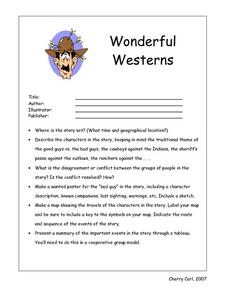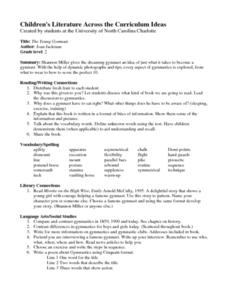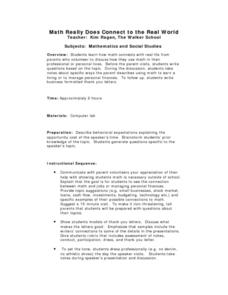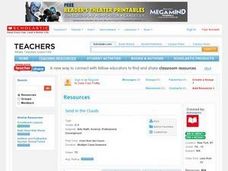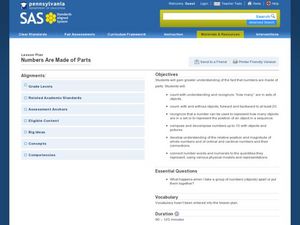Curated OER
The Birth of a Rocky Mountain City and Railroad: Georgetown and the Loop Railroad
Students explore the evolution of a town. In this social studies activity, students discuss why Georgetown and the Georgetown Loop Railroad were developed and discuss life as a prospector. Students write a letter explaining what life is...
Curated OER
Eating Your Words!
First graders study how to complete activities in sequential steps. They participate in various activities describing each step needed to complete the tasks. They work in pairs to type the list of steps necessary in making a sandwich. ...
Curated OER
Wonderful Westerns
For this book report worksheet, students choose a novel about westerns to read and then completes six various assignments dealing with the novel of their choice.
Teach Your Children Well
Spinning a Web
Lisa Trumbauer's big book, Spinning a Web, provides kids with an opportunity to practice word sequencing, to use correct punctuation, and to develop comprehension skills with a cloze reading evercise.
Georgia Learning Connections
Stand By Me!
Get your little mathematicians moving with this experiential activity in which one child is the "tens" and another is the "ones." They collect the number of unifix cubes (in tens or singles) assigned to their respective place values and...
Curated OER
Fraction Spelling
An interesting take on spelling practice is included here! Emerging spellers take their weekly spelling list and create a three-column chart. In the first column, they write the word itself. In the second column, they write how many...
Curated OER
Whale Is Stuck
Students engage in the process of problem solving with the help of children's literature story of how the whale was trapped and then freed. The story illustrates the power of teamwork and commitment. The students practice the skill of...
Curated OER
Understanding Connotation
Lincoln's "Gettysburg Address," which is available online, is used in the language instructional activity presented here. Middle schoolers read through the text for comprehension. Then, they reread the first paragraph and identify all...
Curated OER
The Young Gymnast
Second graders compare and contrast gymnastics in 1859, 1900 and today. Students contrast differences in gymnastics for boys and girls today. Students pretend that they are interviewing a famous gymnast and write up their interview....
Curated OER
Dancing Opposites (Size)
Students create movements that illustrate opposites. In this opposites lesson, students discuss what opposites do for writing and relate to dance. Students make movements based on their opposites.
Curated OER
Up From the Streets: Hip Hop as a Recognized Art
Students discuss the historical roots of Hip-Hop to the present as an example of an art form that arose from the street into popular culture. Emphasis is placed on in-class discussion and written reflections in this introductory lesson...
Alabama Learning Exchange
Phonics lesson for -ick family
Kindergarteners and first graders develop phonemic awareness for words that contain -ick. Each learner gets a stack of cards with different -ick words, highlighting the target sound as they review each one.
Curated OER
Alphabet Sideshow
Learners practice sound and recognition of letters in alphabetical sequence. They gain an understanding of letter sounds and order. They create a slide show with graphics and text. They present their slide show to the class.
Curated OER
Beginning and Ending Consonants
Young readers explore consonant sounds. In this beginning phonics lesson, learners fill in a beginning/middle/end vertical column chart with the sounds they hear in the pictured object. Practice spelling CVC words.
Curated OER
Parts of a Cell Analogy
Students reinforce comprehension of the parts of a cell. Theyl synthesize this content knowledge in a descriptive paragraph writing assignment.
Brain Targeted Teaching
Tuck Everlasting Novel Study
The broad ideas included here provide clear ideas on how to use brain-targeted learning, what activities work best with Tuck Everlasting, how to apply the knowledge gained from their reading, and ideas for evaluation. Not teaching...
Curated OER
Math Really Does Connect to the Real World
Learners listen to parent speakers who discuss how they use math in their professional or personal lives. They take notes and write business form thank you letters.
Curated OER
Vocabulary 15 Practice Quiz
Focus on some difficult vocabulary words that begin with f, g, and h. First, match the 10 vocabulary words to their definitions, and then decide which sentence each vocabulary word best completes. Example words include furtive,...
Curated OER
Meet Our Teachers
Learners of all ages interview, record, and photograph teachers and staff at their school. They organize the photo with a soundbite into a PowerPoint presentation. They transcribe the interview and write a response to it.
Curated OER
Send in the Clouds
Students examine the components of the water cycle and follow step by step directions to build a three dimensional cloud. The vocabulary words used in the lesson are attached to the cloud for a lesson review.
Curated OER
Butterfly Life Cycle
Focused little scientists will flitter their arms back and forth across the room with excitement as they learn the life cycle of a butterfly and how living things grow and change over time.
Pennsylvania Department of Education
Numbers Are Made of Parts
Children play with barnyard animal cards to practice composing and decomposing numbers. With their "secret number" of animal cards in a cup, they shake and spill them onto a barn story board, counting how many animals fall in the barn...
Curated OER
Tense Buster
Pupils, after using the "Intermediate" selection of the Tense Buster software, recognize and practice using passive voice in their writing. As a result of this task, they correctly use five new vocabulary terms with passive voice in...
Curated OER
Inductive and Deductive Reasoning
Students use logical arguments and inductive reasoning to make or disprove conjectures. After observing a teacher led demonstration, students discover that the deductive process narrows facts to a few possible conclusions. In groups,...


